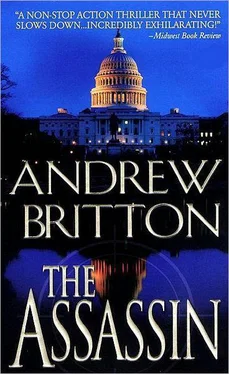Andrew Britton - The Assassin
Здесь есть возможность читать онлайн «Andrew Britton - The Assassin» весь текст электронной книги совершенно бесплатно (целиком полную версию без сокращений). В некоторых случаях можно слушать аудио, скачать через торрент в формате fb2 и присутствует краткое содержание. Жанр: Триллер, на английском языке. Описание произведения, (предисловие) а так же отзывы посетителей доступны на портале библиотеки ЛибКат.
- Название:The Assassin
- Автор:
- Жанр:
- Год:неизвестен
- ISBN:нет данных
- Рейтинг книги:3 / 5. Голосов: 1
-
Избранное:Добавить в избранное
- Отзывы:
-
Ваша оценка:
- 60
- 1
- 2
- 3
- 4
- 5
The Assassin: краткое содержание, описание и аннотация
Предлагаем к чтению аннотацию, описание, краткое содержание или предисловие (зависит от того, что написал сам автор книги «The Assassin»). Если вы не нашли необходимую информацию о книге — напишите в комментариях, мы постараемся отыскать её.
The Assassin — читать онлайн бесплатно полную книгу (весь текст) целиком
Ниже представлен текст книги, разбитый по страницам. Система сохранения места последней прочитанной страницы, позволяет с удобством читать онлайн бесплатно книгу «The Assassin», без необходимости каждый раз заново искать на чём Вы остановились. Поставьте закладку, и сможете в любой момент перейти на страницу, на которой закончили чтение.
Интервал:
Закладка:
Despite his rhetoric, the arrangement was largely satisfactory to Rashid al-Umari. He was doing his part, and in private moments, he could concede the truth: that no matter what he felt, that despite the terrible thoughts that drove him, he was content to speak with his money. He was a student of science, an academic… It was not in him to lift a weapon against his enemy, to find a man in his sights and squeeze the trigger. With this distinction in mind, the view from the periphery was enough to feed his inner rage; he felt no particular need to take the next logical step.
All of that began to change on a cool, still night in late May. It was Rashid’s third trip to Sadr City in as many months, and although he took meticulously planned, circuitous routes out of London, he could not help but fear that Britain’s Secret Intelligence Service — better known as MI6 — would eventually take an interest in his movements. This concern had been expressed to Kohl in hushed tones, along with his displeasure at having to leave so early in the ongoing offensive, despite its undeniable lack of success. It was a familiar refrain, but the German did not offer his usual sympathetic ear. Instead, he spoke quietly of another path. He murmured of men in the north who were waiting to act, and the names he used were instantly recognizable to al-Umari. Some were dated names that went back to his childhood, while others could still be found on every watch list in North America and Western Europe. Here, at last, was the possibility of a real victory. Rashid al-Umari listened intently for two hours and, the following morning, left Sadr City for the last time. He was not sorry to leave it behind.
Since then, his meetings with the foreigner had been extremely limited, their last conversation coming ten days earlier in a musty apartment on the west side of Baghdad’s Jadriya district. In that meeting he’d been given the travel arrangements and the necessary papers, which might or might not have gotten him through an IPS checkpoint. Al-Umari was all too aware of the changing attitude in government service; the American-trained security forces could no longer be counted on to accept a generous bribe in return for safe passage, but as it turned out, he had not been forced to face that particular risk. In fact, the whole trip — including the border crossing south of the al-Maze military airport — had been astonishingly easy. The German had suggested that this might be the case, but that had not stopped him from delivering a seemingly endless litany of security precautions. The foreigner’s words were still clear in his mind, but Rashid al-Umari was a young man with a young man’s stubborn mentality, and the Old City of Aleppo was not without its charms.
The Aleppo souq, one of the oldest in the north and the best outside of Damascus, was somewhat crowded in the early evening. Old women and young wives, most wearing the traditional chador, others daringly clothed in Western attire, ventured out of their homes as the heat finally dropped to bearable levels. It was dark beneath thick canvas draped over stone archways, the individual stalls lit only by crude iron lanterns dangling precariously overhead. Rashid al-Umari turned left on Souq al-Zarb and began making his way through the city market, moving slowly in an attempt to take it all in.
It was truly a wondrous sight. It had been many years since he had seen such an array of goods; it seemed as though there was little one could wish for that could not be found in these crowded streets. Headscarves and jalabiyyas, the long robes worn by men and women alike, could be found in every size and color imaginable. He passed stalls bearing perfumes and spices, fresh meats and vegetables. He turned his head to gaze down one narrow hara and saw row after row of gleaming yellow metal. Another corridor was lined with stands heaped with antique silver jewelry. The sights of the bazaar battled only with the sounds; al-Umari was assaulted from every direction by the calls of Syrian vendors and the guarded replies of their potential customers. The steady sound of passing traffic to the east fought to drown out the tinny whine of an American pop song, which was emanating from a child’s battered radio. It was, Rashid thought, completely chaotic, and yet, there was also something strangely controlled about the whole scene, for these were a people separated only by the worn counters over which they traded.
Certainly, it could not be compared to his own city. One could hardly turn around in Baghdad without seeing another American patrol. The superior smiles were always evident on those clean-shaven faces, despite the vast losses they had sustained. How can they be so persistent? Rashid wondered, the anger welling up as it always did. Why can they not accept that they have failed? It was incomprehensible to this young man that the Americans could be so ignorant of history. Had the British Empire not learned that the Iraqi people could not be ruled? The Europeans had certainly tried, of course, caught up in the New Imperialism which had dominated the last thirty years of the nineteenth century. Al-Umari smiled as he considered what Britain’s greed for new territory in the Middle East had actually gotten them: disastrous losses in Afghanistan at the hands of Pashtun tribesmen, followed by two Anglo-Afghan wars, which resulted in the complete withdrawal of British forces by 1919. His own people had fought equally well the following year. That proud, bloody rebellion against colonial rule had earned the Iraqi people their independence in 1932.
Al-Umari mused over that point as he left the market on the west side and found a small coffee shop. Soon he was seated on a warm wooden bench outside, sipping from a small cup of shai, the hot, sweet tea favored by the Aleppines. Iraqis on both sides of the Sunni-Shia divide could point to the uprising in 1920 as one of the few times they had worked together in defense of their country, and that was something else to consider.
Despite his background, Rashid al-Umari did not believe that the Shiites should be denied a place in the new Iraq. What he had seen in Sadr City, however, caused him to distrust the capabilities of the insurgency. It was reason enough to exclude the Mahdi Army, but there was something else: despite their ill-defined allegiances, al-Umari rightly suspected that they would not be able to get past the attempt on Nuri al-Maliki. It had been deemed necessary; the man was too closely aligned with the West. The fact that he had survived was not at all important. From all accounts, he was in no state to resume his duties, and with the prime minister out of the picture, the Americans were stripped of one of their most powerful allies in the region. It was only a start, of course. Their allies were many, including the oil companies, which had been so quick to prostitute themselves after the fall of Baghdad.
It was so typical, Rashid thought bitterly. History always repeated itself; the greatest of empires were also the greediest. After all, what really separated the current American government from the British imperialists of the twentieth century? The answer was simple: nothing. In the end, the only real objective was to enrich the invading country, and no matter what the Americans said, their intent was not benevolent. One only had to look at the Western contractors pouring into the region to see that.
But what of my ambition? Rashid Amin al-Umari lifted the cup to his lips once more as he considered that point. The plan they had set in motion, the laborious, dangerous weeks spent making contact, would benefit his people as a whole. Of that, he had no doubt. He was sincere in his desire to liberate the Iraqi people from their most recent oppressors, though his motivation was decidedly less pure in its origins.
Yes, he finally admitted, I am almost as selfish as the Americans.
Читать дальшеИнтервал:
Закладка:
Похожие книги на «The Assassin»
Представляем Вашему вниманию похожие книги на «The Assassin» списком для выбора. Мы отобрали схожую по названию и смыслу литературу в надежде предоставить читателям больше вариантов отыскать новые, интересные, ещё непрочитанные произведения.
Обсуждение, отзывы о книге «The Assassin» и просто собственные мнения читателей. Оставьте ваши комментарии, напишите, что Вы думаете о произведении, его смысле или главных героях. Укажите что конкретно понравилось, а что нет, и почему Вы так считаете.












